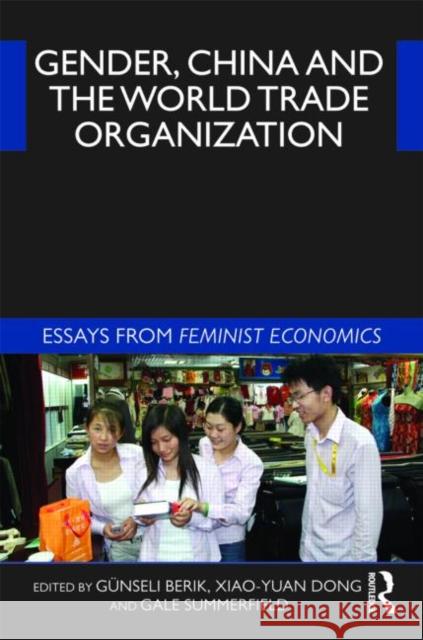Gender, China and the World Trade Organization: Essays from Feminist Economics » książka
Gender, China and the World Trade Organization: Essays from Feminist Economics
ISBN-13: 9780415499040 / Angielski / Twarda / 2009 / 326 str.
Gender, China and the World Trade Organization: Essays from Feminist Economics
ISBN-13: 9780415499040 / Angielski / Twarda / 2009 / 326 str.
(netto: 186,53 VAT: 5%)
Najniższa cena z 30 dni: 186,33
ok. 16-18 dni roboczych.
Darmowa dostawa!
China's joining the World Trade Organization at the end of 2001 signifies a milestone in the country's global integration after two decades of economic reforms that have fundamentally transformed the economic organization of China. This collection seeks to identify the gendered implications within China of the country's transition from socialism to a market economy and its opening up to international trade and investment. The changes have created greater wealth for some, while at the same time, serious gender, class, ethnic, and regional disparities have also emerged. Drawing from historical, analytical, and policy-oriented work, the essays in this collection explore women's well-being relative to men's in rural and urban China by looking at land rights, labor-market status and labor rights, household decision-making, health, the representation of women in advertising and beauty pageants. This book was previously published as a special issue of the journal, Feminist Economics, the official journal of the International Association for Feminist Economics (IAFFE). All contributions have been subjected to the journal's rigorous peer review process and comply with the journal's editorial policies, as overseen by the editor, Diana Strassmann, and the journal's editorial team, including the associate editors, the editorial board, numerous volunteer reviewers, and the journal's in-house editorial staff and freelance style editors. The special issue and book have been made possible by the generous financial support of Rice University and the Ford Foundation-Beijing.
China’s joining the WTO at the end of 2001 signifies a milestone in the country’s global integration after two decades of economic reforms. These reforms have fundamentally transformed the organization of agricultural production and marketing, increased foreign direct investment, and brought tremendous growth in manufacturing and exports. This collection seeks to identify the gendered implications within China of the country’s transition from socialism to a market economy and its opening up to international trade and investment. The changes have created greater wealth for some, while at the same time, serious gender, class, ethnic, and regional disparities have also emerged. Drawing from historical, analytical, and policy-oriented work, the essays in this collection explore women’s well-being relative to men’s in rural and urban China by looking at land rights, labor-market status, household decision-making, health, the representation of women in advertising and beauty pageants.
Contributors employ a broad range of methods to show that while Chinese women as a whole have benefited from varied employment and consumption options, they face pressures to conform to traditional gender roles and unattainable western standards of feminine beauty, growing insecurity of land rights and employment, declining access to health care and an increasing elderly care burden.
This book was previously published as a special issue of the journal, Feminist Economics, the official journal of the International Association for Feminist Economics (IAFFE). All contributions have been subjected to the journal's rigorous peer review process and comply with the journal's editorial policies, as overseen by the editor, Diana Strassmann, and the journal's editorial team, including the associate editors, the editorial board, numerous volunteer reviewers, and the journal's in-house editorial staff and freelance style editors. The special issue and book have been made possible by the generous financial support of Rice University and the Ford Foundation.











